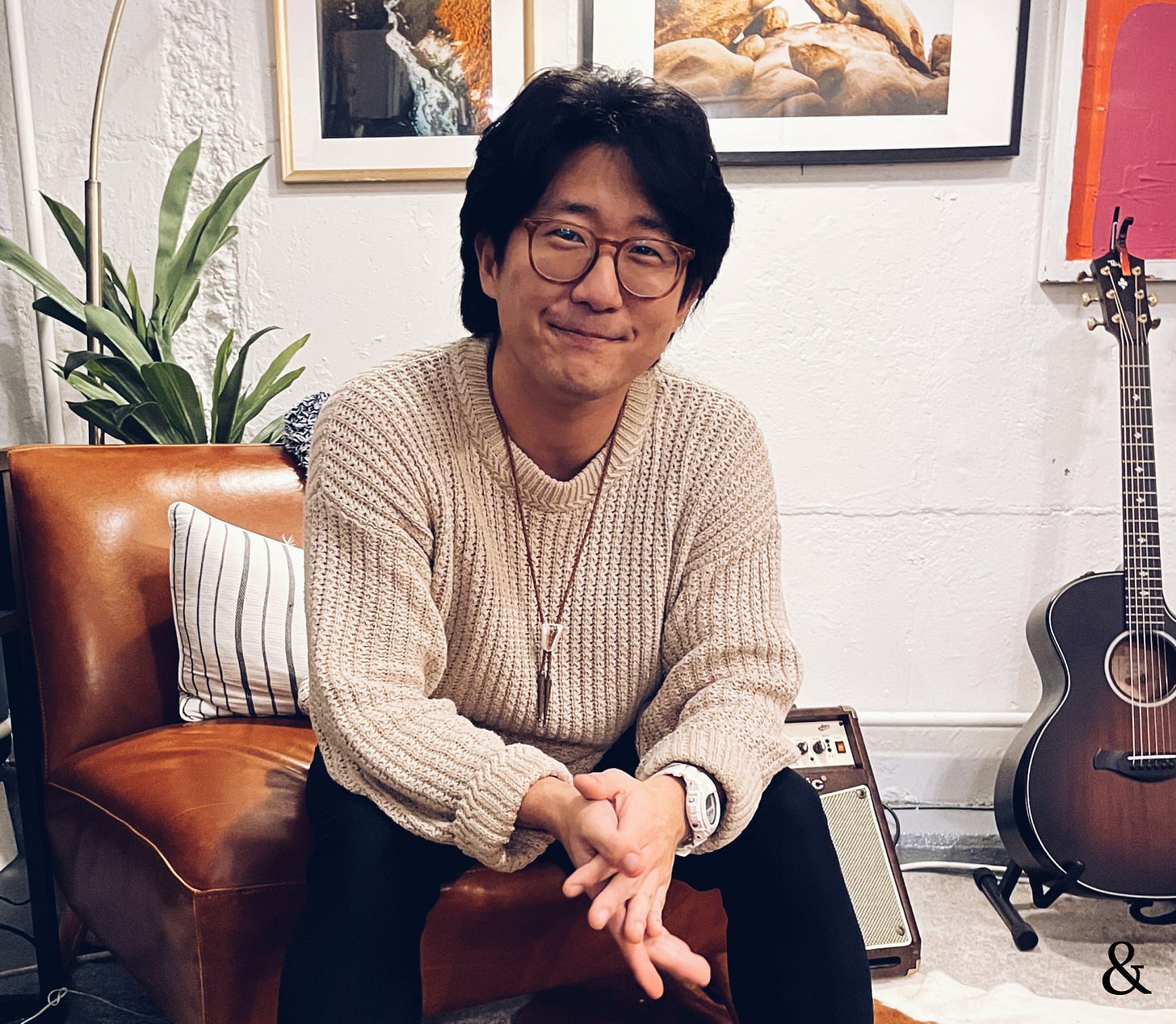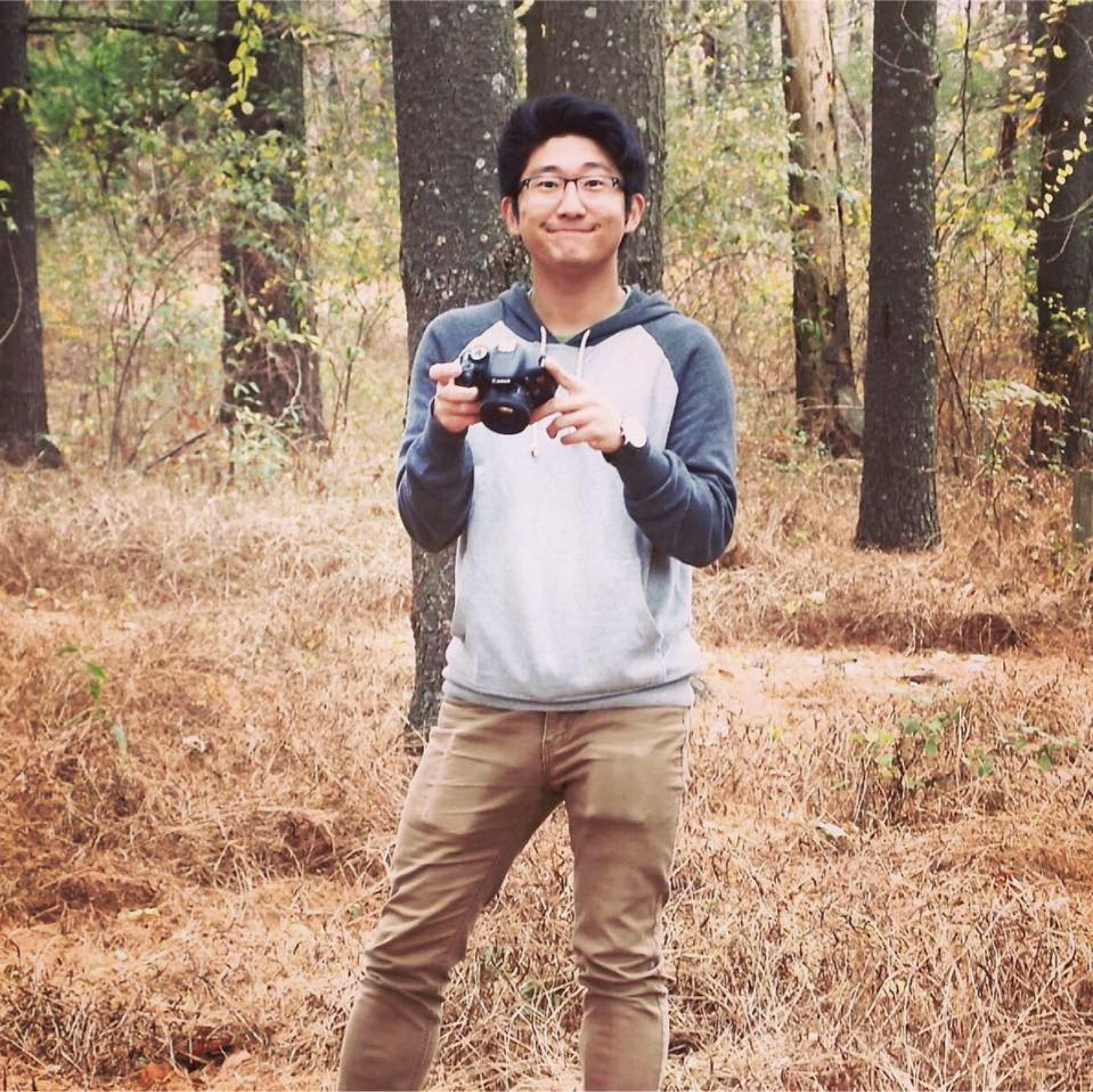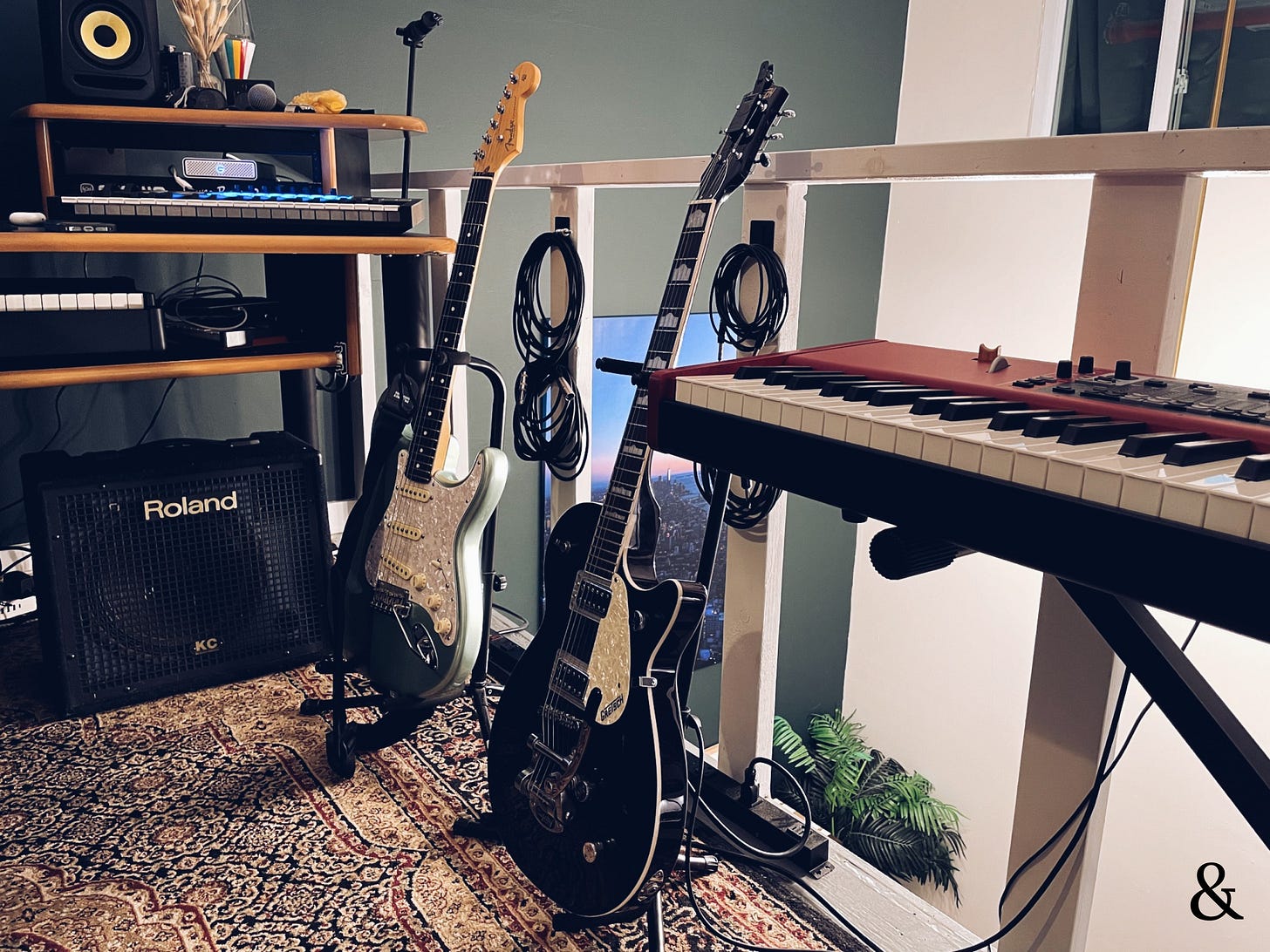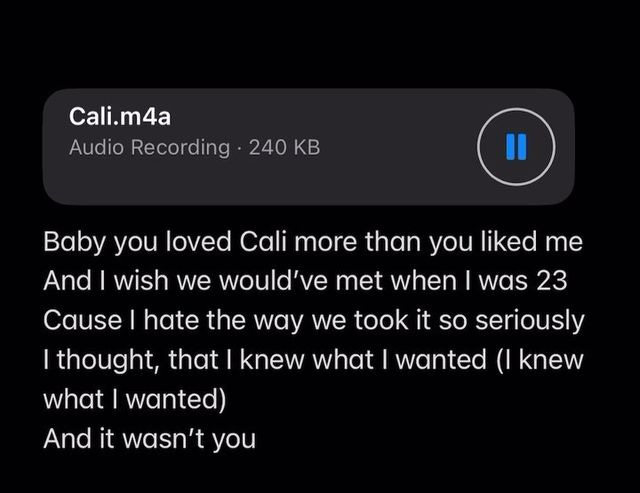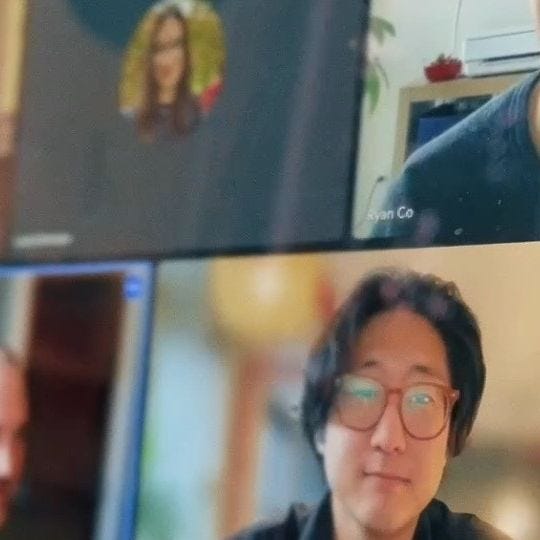Sam Ray Lee on how creativity can be a full-circle journey
Meet Sam Ray Lee, a musician, singer, songwriter, UI/UX designer, freelance photographer, and one-half of the musical duo Umami House based in Brooklyn, NY.
Meet Sam Ray Lee, a musician, singer, songwriter, UI/UX designer, freelance photographer, and one-half of the musical duo Umami House based in Brooklyn, NY. Sam's creative journey starts from an early age. It morphs into an integral part of his identity, with each new pursuit growing and adapting to particular periods of his life. He shares how music came into his life and temporarily left when he married at an early age and how divorce brought him back to embracing and pursuing his creative musical journey. That and how other creative pursuits like photography and design have enabled his musical journey. We also get a glimpse into the origin of how Umami House came to fruition and parting advice for his early self as he set off into his creative journey and identities.
Interviewed in December 2023
Heads up, the interview contains some explicit language that may not be suitable for all audiences. This conversation has been edited for clarity and brevity.
Can you introduce yourself and what you want the audience to know about you? Hi, I'm Sam. I'm newly based in Brooklyn, New York. I am a musician, singer, songwriter, UI/UX designer, and freelance photographer. Also, on my naturalization certificate, since I became a citizen in the summer of 2020, it says divorced.
Let's take a step back: could you pick a point in time to share the origin of how your creative pursuits started since you mentioned so many different parts of your identity? I find myself at a crossroads between many creative avenues and mediums right now—music, photography, design, or creating content. Whatever I do in my life that I love has something to do with creating something.
And so, the day that started for me was when I was 12 years old; my mom got me a "birthday gift": a guitar. She just wanted me to start extracurricular activities, but that was the first time I got totally obsessed with something. I remember I broke my right arm within the first month of having that guitar. I wore this giant cast so that the first guitar had all these marks from my cast. That's how obsessed I was with playing guitar.
I was always the person who, while I had friends, also had a loner personality. I would skip lunches sometimes in high school and just go to the guitar ensemble room, pick up a guitar, and be that strange kid just playing in the hallway. That was when I found playing guitar was the place where I could retreat from my life.
In your present day, you're spending a lot of time creating. However, looking back at the moment you picked up your guitar, was that the first time you were learning to create or just experiencing it? Are you just jamming to play music versus playing the guitar to have a tangible outcome? I was just experiencing it for sure. I didn't know what I was walking into, and I just knew I had enough of a knack for it. And it was something that I could continue learning and almost build a relationship with that guitar. That led to this wonderful thing that keeps happening even today, where the music I played or connected with connected me to other people and friends I would make later in life.
[Playing music] led to this wonderful thing that keeps happening even today, where the music I played or connected with connected me to other people and friends I would make later in life.
When I first started playing, my mom signed me up for summer camp at church, where I found these worship leaders playing guitar. They brought me up to be a worship leader. And that exposed me to all sorts of relationships that I would build with music. In that church scene, you're not only playing music but also worshiping, whatever your faith might be. That was kind of a reflection of my life where music was something more than just noises that you made with an instrument or notes you're singing. It was something that connected me to something way bigger than life.
Even today, if I'm playing a show or writing a song, I sometimes think back to those moments when I would "worship" and reach certain highs in music that you're not always able to reach or find in your regular life. Music always felt like something bigger than just myself.
Is creation also a form of communication? Or is it more connection with communities or whatever is around you? I would say it's a form of communication for sure. Because there are people I've met, before even saying any words to each other, we would have a musical conversation. I might play a few notes on the guitar, and they're able to swing something back with whatever they're playing or singing. And that's happened with many relationships. Fast forwarding to now, these are some of the best buds I have in my life. And that didn't mean those relationships didn't start because I went up to them and said, "Hi." It was literally just this instant connection where we were both having a moment. And having conversations with one another just via music? Yes. It's probably the closest thing you can get to, like love at first sight. Or love at first "hear"? Laughing
That's very different for me because I don't create any music but am a huge music consumer. That feels a bit more one-way than what you're experiencing: a full two- or multi-way conversation via music. I find that a lot of people have a favorite artist. I assume one of the reasons they love that artist is because they feel understood by that artist. That artist is creating songs that make the consumer feel understood. That's the same sort of feeling that you get when you're jamming or just in that creative space.
I could be playing something. I look over, and a guy's looking at me, and he just nods his head or has a stank face on. And I'm just like, I feel understood. No matter what degree you feel understood by someone, this instant connection exists.
Were there other creative pursuits that started around this time? Throughout all of middle and high school, I thought it was going to be just guitar, a bit of singing, and then also some writing. But guitar was certainly my main voice, the main boat I would take on my creative journey, and I didn't think I would do anything else. It was like when you were still living with your parents at that time, and your world was only as big as you know. You have less freedom to venture out.

After I graduated high school, my mom moved out to L.A. I moved in with my best friend's family because I wanted to live on my own, get my own room, and figure that out. So, I was still in Fairfax, Virginia.
At that time, I could not for the life of me figure out the transition period from graduating high school and what college to go to next. I didn't really apply to many colleges and eventually caved and decided to go to community college until I figured out what I was going to do. So, I went and studied music.
I figured it was like, "Well, what else would I do?" The logic for me was just, "Well, I'm going to do this music thing anyway." So, when I got to the community college, I ended up hating my professor. It was probably the format of learning for me that just wasn't very helpful.
At a certain point, I realized I didn't need [school] to do what I love with music. So I dropped out, and that was the first time I dropped out, and then I didn't know what I was going to do anymore. My best friend at the time was doing a lot of freelance videography, so I picked up a camera. I was like, "I'll try out some videography," but then I ended up just falling in love with still photography instead. And I instantly got obsessed with that and started buying lenses and figuring out what I liked.
Were you learning photography and videography on your own? Yeah, I figured out which photographers inspired me, like Trey Ratcliff. It was the first time I ever cared about anyone's photography style. He was a pioneer in HDF photography, which is when you take multiple exposures of a single image where it's underexposed, regular, and then overexposed. Then, you combine it all together, and what it does is give you this highly detailed, wide dynamic range. The highly detailed photo shows you everything in the shadows and highlights, and it provides this capability for a really overly colorful image—like stuff I would never edit today. But, at the time, I thought it was really cool.
Then, I realized there was this whole world in both composition and post-processing. That was really cool because I figured out that when you take a photo and edit it, you express your reflection of that moment and what your perspective is. And so, that was a parallel to what I found in music where I was like, "Wow, this is how I self-express in photography." Especially in the process of editing in photography? Yeah, especially when you're editing. Composition matters because that's your style of how you're choosing to capture that moment. But there's this whole other world that's unlocked when it comes to editing.


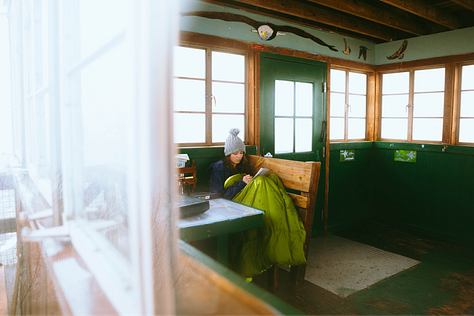
What about design? How did you get into pursuing design? So, I did freelance photography for a while and would get these gigs on and off. It was one of the most fun phases of my life, and it enabled me to travel and just fuck around and have fun. laughing
But then, it wasn't consistent income, so I was trying to figure out how to make it. Design was that solution because I talked to my cousin at one point, and he was a Graphic Designer at Lexus. And he was like, "If you're looking for something creative and trying to make money, why not try design?"
I went back to community college and started studying some design courses. I wasn't very good. I remember we had to make a vector sandwich on the first day of class. It was just about teaching you how to trace and create shapes and stuff. I remember thinking that my sandwich looked so bad compared to everyone else. So I was very behind and had to quickly figure out, "Okay, how am I going to survive this?"

Through photography, I had a really good eye for composition and figuring out visual hierarchies and how to balance certain elements. I also had a knack for typography and how to utilize it. As I said, I was a really terrible student, so I ended up learning design on my own outside of class.
I would skip some classes and show up to the presentation phase. And then, in the middle of that, I got an internship at a digital marketing agency, which eventually turned into a full-time job offer.
I dropped out of school again because school was teaching me about print—which I loved the idea of more than executing. And so, I was like, "Well, I can just learn through this job." And that's what I did. It was an awesome experience because, through design, I had to learn a lot about what collaboration looks like and work with so many different roles, departments, deadlines, etc. That was probably the first time I fell in love with design because of the collaborative aspect of it.
Were you collaborating through music and photography at that time? Not really. Music was the church band, which, of course, I had to collaborate on. But, I think for me, [music] was special because it was self-expression, and it was about letting something out from within me. Then, design was all about the client. I never actually experienced design in a way where it was just me creating something to just create something.
Do you think there's a difference between how music, photography, and design allowed you to collaborate and self-express due to how they came into your life? With guitar, it was more "try this" versus photography, and design came about as a way to survive. Is that still true today? For design, it is, in a way, a means to a living. One thing I like about design is that you can find a lot of design roles out there. There are so many places that need designers, and I guess that's where the true feeling of safety comes for me—in terms of making a living.
The reason I'm at my particular [role] now is because it also feels really good to do something that's actually making a difference in the world. A lot of our clients and the spaces that they're in are very focused on progressive movements, including social justice. And so, it feels really good to know that you're doing something positive.
I asked this question because, as a designer, I speak candidly with many people about this topic. Product design is my day job, and I appreciate everything it's provided me. It's also something I've wanted since I learned about what it was, considering that it could bring me further in my career and life. But, at the end of the day, I don't think that's who I am or will be forever.
It feels like a cop-out because I don't know what else to do or who I am, so I'm so attached to this role and identity. So, I always love asking other people, especially designers, like, "How did you know you wanted to be this forever?" Because I didn't, and I didn't even know the role until I stumbled into it. That survival mode kicked in for me as a kid with immigrant parents, and the amount of money one could make as a product designer was a big draw for me to do that rather than graphic design. Does any of that resonate with you? Absolutely. I completely forgot [to share] about this one chunk of my life where, between photography and design, I got married really young.
I got married at 21 and divorced at 22. That was the period in my life when I realized that I already had been designing. But by the time I got married, I realized that design suddenly took on a very different role in my life.
And with design, I can see a path where I can figure out how to make even more of a living through design so it can support a potential family in the future. Design definitely had a very specific and heavier role in my life at a certain point. Heavier because it could afford you a certain life? Yeah, because it was the one thing making me real money.
And so, I was like, "I gotta be really good at this now" because it's not just me alone anymore. Suddenly, it's me with my wife and our pets. I felt a lot of pressure then to perform really, really well and take myself more seriously, especially on the business side. That includes how I talked to managers and directors and learned how to put on a different face. A bit of code-switching? Yeah, because most of my life, I've been flying by the seat of my pants. And that was a moment where I was like, I can't do that anymore. I gotta follow through with this and this imaginary syllabus that I had in my head for how to be very successful at design.
I don't feel that pressure anymore. I don't even know if I'm going to do design for the rest of my life at this point.
So what happened next—what was the switch from where you were to where you are today? The switch happened once I got divorced. It took me really working on myself all the way up to the point where I was just like, "Okay, it's not just me; I'm living a very different life now where I'm trying to support other people in my life."
And then all of that, just like poof—disappearing really, really suddenly. It was really weird for me. I'd been in this relationship for four years, and now it's just me by myself. I had an identity crisis because I was like, "Well, what do I like to do in my free time?"
I was stressed out when I was married because of those pressures, which taught me a lot. But, at the end of the day, it just wasn't good for me mentally. So when that mental space was cleared up, and I had to just focus on myself, it brought me back to certain things like music because when I was married, I didn't play much music. I had to come back full circle to music.
Walk us through that experience and how Umami House started. I was still in Fairfax when I divorced in 2019, right before Covid [the pandemic]. It was 2019 when I got back into music and realized I loved music.
Around that time, I thought I was going to quit music. I was selling all my pedals and posted on social media [about it]. I can't imagine you doing this! I was getting rid of a bunch of guitars, and [our friend] Alfred replied to one of the stories that he was interested.
How did you meet initially meet Alfred? We were friends already because we met back in 2016 at an open mic. Alfred was still in college then and then moved to New York. We didn't hang out for a long time, and I was still single before my marriage when I first met Alfred. And then, after we first met, I went through my whole married life. Alfred went through his life in New York, and we had very separate paths.
So when he replies to the story where I'm selling my pedals, he's like, "I'd love to check out what pedals you have." He came over, and while he didn't buy any, we jammed anyway. And I realized, at that moment, like damn, I still really freaking love playing and realized, shoot, I just sold some of my favorite pedals.
But it was great because I got to explore a totally different side of music. I had sold a lot of my gear and was stripped down to just one guitar, which was a Taylor GS Mini. It's not even full-size, and I don't think I even had a single electric guitar at the time. Real back to basics.
And that was when I started really exploring songwriting again because suddenly, it wasn't just about ripping it on the electric guitar. Which we know you can do! laughing Yeah! You know, like, all the distractions were gone. I had an acoustic guitar, my computer with Garage Band, and a lot more time with myself. And there was certainly a lot to write about, so that started a new era with music for me.
I approached it very differently. At that point, the guitar and I were going for round two, like in a relationship with someone, you know? You approach it very differently.
Were you more open to embracing your music to try something new? Or did you feel you had the same approach when you first picked up the guitar? I had a very different approach. I almost stopped caring about learning at that point.
For me, musically, I cared a lot about learning. Whenever I play a show with this really good guy, I think about how I can't play as well as him and all this stuff. But at a certain point when I was in that phase, around 2019 and 2020, I realized I had all the pieces that I needed. I have a lot more to write about now. And so, let's see what we can do with it. And I never thought about it that way before. Once I acknowledged that, the ball started moving.
So, how did you and Alfred start Umami House? So we reconnected, and Alfred returned to the Northern Virginia area during Covid. Then, we started hanging out a lot. Eventually, I introduced Alfred to a lot of my friends, and then a lot of Alfred's friends and my friends started mixing. It was just very natural and more than just jamming together; natural friendships started happening.
Like, there was one day when no plans were made, and no one could have predicted this. It was a random Sunday afternoon, and Alfred asked me, "You want to go to New Orleans?" He wasn't thinking about New Orleans at that point, and I think we were just on a phone call, and I was like, "Man, that one time in New Orleans..." And then Alfred was like, "You wanna go?" I was like, "Yeah, why not?" We were both working remotely and went on this two-three week-long trip. From New Orleans, we headed to Colorado, Utah, and Vegas somewhere. Really freaking random.
Suddenly, this friendship had developed to the point where it was like, "Oh, here's another guy who knows how to roll with the punches and be spontaneous." Because, my whole life, I've been very "flying by the edge of my seat," and it was cool to find someone else who had that similar energy.
All the while, we're still jamming together occasionally. When fall eventually started, we became roommates. And by winter of 2022, we're in Montana at this bar in the middle of nowhere, and we're just talking about how we've been friends for this long, and we all play this music together. We throw a lot of parties, and at the end of the parties, we forget that we're hosting and play a lot of music.
And so, we were like, "We're not gonna leave this bar until we come up with a name for this new band," That's how Umami House came to be. Then, from there, it was just figuring out, "What does this mean to us? Where do we want to go?" And we've been a duo ever since.
Why is any of this important to you overall? It's important to me because when I'm having day-to-day conversations with people, you're not always entering the deep zone with every single person...because that'd be weird or pretty intense. But whether it's music or creating some sort of story for design or photography, you're expressing yourself in a way that you can't always express with words to other people.
For me, it's always been like a retreat. Or just this way to connect myself by creating that art. Otherwise, I don't know where I would put all that energy.

Is it a way to connect with yourself to then be able to connect with others? I will say it has always started with just being for myself and connecting with other people; things just happen naturally. Because you get to know yourself more through that process of creating. For example, let's say you're painting something, and you paint for hours and hours and hours. You take 10 steps back and look at that painting, and you're like, "Where the hell did that come from?"
And with songwriting, I'm trying to practice a lot of honesty when I write songs. There's this line that I heard once where someone said, "You know, if you feel like you're oversharing in a song, then that probably means that's good because that probably means that someone else out there will get it." That really stuck with me.
These connections with other people through music just naturally happen because I am trying to be honest with myself, almost overly honest. And when that side shows through whatever I'm creating, someone else out there really does get it because it's true and genuine. Because of most things you go through in life, there's a good chance that someone else has felt or experienced those things, too. But you never really talk about it. So, if you're expressing that through the art, someone else out there will hit their radar.
Because of most things you go through in life, there's a good chance that someone else has felt or experienced those things, too. But you never really talk about it. So, if you're expressing that through the art, someone else out there will hit their radar.
Let's talk assumptions. One assumption people may have of you, myself included initially, was that you're a full-time musician. Living in D.C., you get the "What do you do?" question almost all the time. More than New York? Way more than here. It depends on the crowd. Because I think there's this shared understanding across a lot of people [in New York] where we hate that question. You're self-aware about it. In D.C., that's all that other people cared about. So whenever people used to ask me, I used to answer, "UX designer." I didn't realize that I was doing it because of this, and that automatically gave me a card into a certain social circle or amount of intrigue.
And so, I used to do that and realized a lot of people back then didn't realize I did music at all. I just had this switch turn on in my brain where I was totally embarrassed by the fact that I create music and afraid they'd judge me for it. That's so different now.
I made this conscious decision to be like, whenever people ask me that next, I'm going to say musician because that's what I want to be. That's what I want to be doing more of, and if I don't take myself seriously, then why would anyone else take me seriously? Even my Instagram has nothing but music on it.
I made this conscious decision to be like, whenever people ask me that next, I'm going to say musician because that's what I want to be. That's what I want to be doing more of, and if I don't take myself seriously, then why would anyone else take me seriously?
Fast forward, it's all flipped for me now. Now, a lot of people don't think that I do any design work, and they just know me as a singer or musician. A lot of people don't know that I work eight hours a day or more doing design work while trying to juggle everything else as well.
How do you balance it all? One of the misconceptions for those of us who have full-time roles and do something on the side is that it's continuous. For west & ease, people often ask, "How do you prioritize all of this?"
My usual answer is, I don't. I have no time, but I'll have spurts. For example, my last interview was in May 2023, and I only recently posted it in October. I didn't have any capacity to focus on it, and I'm finally getting my second wind for the year to try again. But many people don't know that they think it's continuous.
So, do you feel a similar pressure or misconception around balancing and juggling all these parts of your identity? I feel some pressure, but I don't think it comes from other people.
It's anything but that for me. What you think is really obvious to you is not actually that obvious to most people out there. That definitely shows through design and marketing.
Part of the reason why people think that I am a full-time musician is probably because some of the branding I do around my social media is very intentional. It's still real stuff, but I'm being intentional about what I'm sharing. So I've never felt the pressure from other people.
And how do you balance it? I...sometimes don't. laughing Sometimes there's like nothing I can do. There are phases where I'm doing a lot more. Most of the time, I'm doing a lot more design work than music.
But, this move to New York has been quite the transition. I had this problem in D.C., too, but like saying "no" to going out—I'm still really bad at that. I'm realizing these days that I just need to have time for myself. And I need a bit of quiet time because if you stop shaking the bowl, everything will just settle, and you get to figure out, okay, where is everything in my life again? So, taking more time for myself to create.
Switching gears—what advice do you have for your past self who started doing what you're doing now? "I know it doesn't make sense right now, but I promise it will one day." laughing I felt a lot of pressure when I was moving from music to photography to design. I went through, as creatives do, at least once a year, I went through so many identity crises. Like, "What the heck am I doing?"
I know it doesn't make sense right now, but I promise it will one day.
There was a lot of worry about never being able to do what I love ever again. Or just worrying a lot about, like, "Who am I going to be like ten years from now?" And I would never have expected any of what's going on today, five or ten years ago. I would tell myself that it'll all make sense and just keep doing what you're doing because things come back full circle. Eventually, you'll learn what you learned during those times, and then, later on, it will come back to you. You'll look at it in the face again and be like, "Wow, this is just right."
I would tell myself that it'll all make sense and just keep doing what you're doing because things come back full circle. Eventually, you'll learn what you learned during those times, and then, later on, it will come back to you. You'll look at it in the face again and be like, “Wow, this is just right.”
And still, even now, there's so much I don't know what the heck I'm doing sometimes. But it's nice to look back, and you're just like, "Damn, these pieces really did come together." They are still coming together, but it's cool to see the progress.
Give us a list of the top 3 things you'd recommend.
My 3 tips for starting to learn photography!
Get yourself a prime lens! It can be really easy to get distracted by all the bells and whistles of your gear - so sticking to one focal length can really help you figure out your style as you're forced to move around and 'hunt' for the right shot. My first prime was a nifty fifty (50mm prime) and it was instrumental in helping me figure out my approach and which gear I really need next.
Don't be afraid of post-production/color grading - in fact, go crazy! 50% of the art is shooting and composition, and the other 50% is how you choose to edit your work to best portray how you experienced the moment. Every photographer has their own perspective on life and it's up to you on how you want to reflect that perspective.
Trust your opinion. There'll be a lot of people giving you advice along the way - some of the advice will probably be really helpful, but trust your gut and recognize that your opinion on the matter, matters. For example, if you want to shoot super blurry images and you feel something special out of it, why the hell not. If you want to make your photos super saturated because that gets you excited, lean in. Figure out more of where that excitement is coming from.
Favorite song or song you have on repeat at the moment?
"Call Your Mom" by Noah Kahan ft Lizzy McAlphine
Going back to what I was saying before about being honest in your songwriting, it's not just about being honest but also about being vulnerable and reaching for a vulnerable audience through songwriting.
This song does such a good job of that; it's talking about a moment where you're talking to a friend who may not be in the best mental state. They're probably really depressed in whatever situation they are in. The lyrics are examples of what you'd say to that friend.
It really hits you deep because it's certain lines that take you back to certain moments in your life where you're like, damn, I remember the times when I've had to say that to someone.
Enjoyed the Conversation with Sam Ray Lee? You can follow him at @samraylee and @umamihousemusic on Instagram. You can also listen to Sam and Umami House’s music on Spotify.
Sam is also passionate about giving back to Send Chinatown Love.
Send Chinatown Love's mission is to respond to the needs of Asian-owned businesses by providing customized services and resources while also creating opportunities for our community to connect with these businesses. With all initiatives, Send Chinatown Love hopes to build a more resilient future for these businesses and NYC's Chinatowns. A donation was made to Send Chinatown Love as part of this Conversation.
You can support Send Chinatown Love by donating directly.



